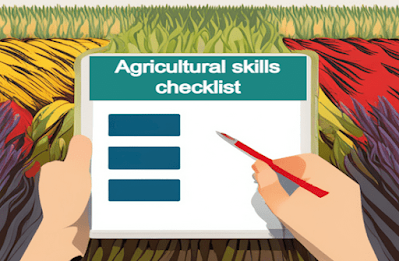The agricultural skills checklist covers a wide range of areas such as crop production, animal husbandry, soil management, and agribusiness management. Here is a comprehensive list of practical skills and soft skills that may be required for someone working in agriculture in 2025:
- Crop cultivation and management.
- Irrigation management and water conservation.
- Soil management and conservation.
- Fertilizer application and management.
- Pest and disease control.
- Livestock management and care.
- Harvesting and post-harvest management.
- Agricultural machinery operation and maintenance.
- Marketing and sales of agricultural products including the best agriculture companies products.
- Record keeping and data analysis. $ads={1}
- Financial management and budgeting of agriculture business.
- Knowledge of relevant laws and regulations.
- Communication and interpersonal skills.
- Adaptability to changing weather conditions and physical labor.
- Environmental sustainability practices.
- Understanding of plant and animal biology.
- Ability to work in a team and lead others.
- Technical skills for operating equipment and tools.
- Basic computer skills, including word processing and spreadsheets.
- Knowledge of different plant varieties and their characteristics.
- Understanding of plant growth and development.
- Ability to diagnose and treat animal health problems.
- Familiarity with animal behavior and psychology.
- Understanding of genetics and breeding practices.
- Knowledge of feed management and ration formulation.
- Ability to evaluate soil and water quality.
- Familiarity with sustainable farming practices.
- Ability to manage and maintain greenhouses and other structures.
- Knowledge of food safety and quality standards.
- Understanding of agricultural supply chains and grain market trends.
- Ability to perform basic repair and maintenance tasks.
- Knowledge of weather patterns and how they affect crops and livestock.
- Ability to implement efficient and cost-effective farm management strategies.
- Familiarity with renewable energy technologies and their application in agriculture.
- Understanding of food processing and preservation techniques.
- Knowledge of animal welfare and humane treatment practices.
- Ability to conduct research and gather data for informed decision-making.
- Understanding of conservation practices and wildlife management.
- Ability to identify and manage risk and make contingency plans.
- Knowledge of transportation and logistics for moving agricultural products.
- Ability to work with local and regional government agencies and organizations.
- Knowledge of climate change and its impacts on agriculture.
- Understanding of the role of technology in agriculture, such as precision agriculture and drones.
- Ability to collaborate with agricultural professionals and organizations to drive progress and innovation.
- Familiarity with international trade agreements and their impact on agriculture.
- Ability to manage and lead a team of employees and contractors.
- Understanding of environmental regulations and their impact on agriculture.
- Knowledge of the principles of organic and sustainable agriculture.
- Ability to implement and manage food safety programs and protocols.
- Understanding of crop risk management programs.
- Ability to analyze and interpret data to make informed decisions.
- Knowledge of different methods of soil testing and analysis.
- Understanding of plant nutrition and nutrient management.
- Ability to manage soil fertility and soil health.
- Familiarity with the use of biostimulants and biopesticides.
- Understanding of the use of cover crops and intercropping systems.
- Ability to implement precision agriculture techniques.
- Knowledge of food packaging and labeling requirements.
- Understanding of renewable energy systems and their application in agriculture.
- Ability to perform cost-benefit analyses and make informed investment decisions.
- Understanding of the principles of agroforestry and its applications.
- Familiarity with crop rotation and soil management practices.
- Understanding of the principles of precision irrigation.
- Ability to manage soil moisture and improve water-use efficiency.
- Knowledge of soil conservation and erosion control practices.
- Understanding of the use of renewable energy in agriculture, such as wind and solar power.
- Ability to design and implement crop and livestock production systems.
- Knowledge of animal behavior and welfare practices.
- Familiarity with the use of geospatial technologies in agriculture, such as GPS and GIS.
- Understanding of the principles of agribusiness management.
- Ability to use data analysis tools and techniques to improve farm management.
This list is not exhaustive and the specific skills required will depend on the type of agriculture being performed and the role of the individual within the organization. These skills will help individuals working in agriculture to be successful in their roles and contribute to the growth and sustainability of the agricultural industry. However, having a diverse skill set and the ability to adapt to changing circumstances can be beneficial for success in the agriculture industry.

